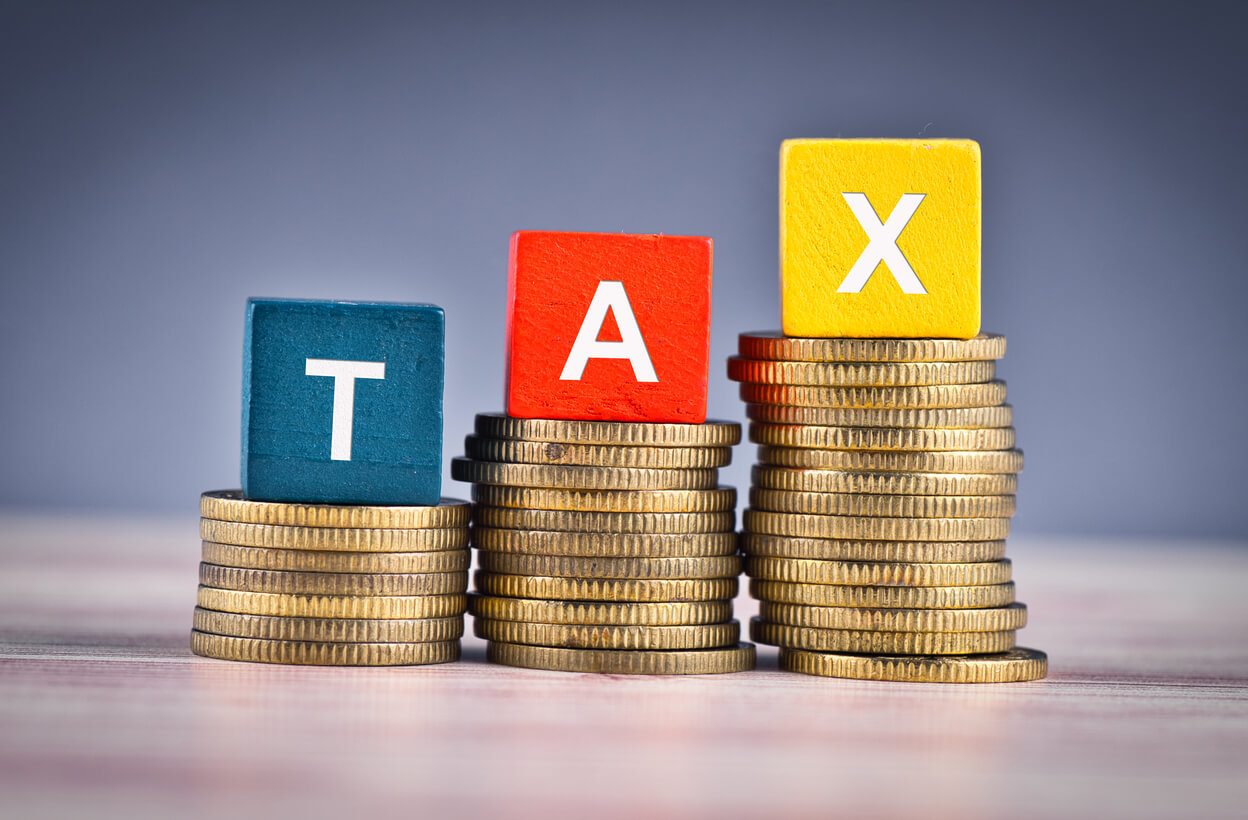
- “Startups in the crypto area have been going more and more onshore and have been avoiding tax havens.”
- There are “huge discrepancies between how crypto is viewed and how it is taxed.”
- The rapidly evolving nature of crypto continues to introduce new complications and ambiguity.
Crypto is now a billion-dollar industry. While reports covering the entire sector are patchy and overly conservative, filings from individual companies speak to the growing scale of crypto, with Coinbase and Blockchain.com alone generating USD 7.35bn and USD 1.5bn in revenue in 2021, respectively.
These are relatively big figures, yet they raise an important question regarding tax. Because with crypto-related companies benefitting from the resources and infrastructure that have been cultivated in part using tax (e.g. educated people, energy grids, telecoms networks), there’s a strong argument to say that they should, in turn, be contributing to the system they’re benefitting from.
So few crypto firms are publicly listed, meaning that it’s nigh-on impossible to say with any certainty how much the sector as a whole actually contributes to public finances. However, industry figures affirm that all legally registered companies comply with all applicable taxation laws in their respective jurisdictions, implying that crypto’s tax bill is indeed growing in parallel with its revenues and profits.
The crypto sector and tax: Havens and reputational risks
The relationship between the crypto industry and tax is something of a mystery, if only because so many major crypto exchanges and businesses are registered in tax havens.
For instance, Binance’s holding company is said to be currently registered in the Cayman Islands, a tax haven where corporations pay no income, capital gains, payroll, or other direct taxes. Similarly, Bitfinex is registered in the British Virgin Islands, BitMEX and OKX (formerly OKEx) in Seychelles, and Huobi in Gibraltar, to name a few others.
Not only is Binance the biggest crypto exchange in the world by volume, but the registration of so many other major exchanges in havens indicates that they — and the industry as a whole — escape paying the kind of tax they would do if they were based where most of their customers are also located.
However, despite the fact that the industry — like many other industries too — isn’t paying all of the tax it theoretically could, commentators suggest that it’s getting better at contributing to public purses. Indeed, for exchanges and other firms setting up nations that aren’t tax havens, they have no option but to pay tax if they want to be regulated.
“While in 2017 it was the usual practice for many [initial coin offering] teams to incorporate companies on the British Virgin Islands, on Seychelles, or in other tax havens, as far as I’m aware startups in the crypto area have been going more and more onshore and have been avoiding tax havens. This is mainly due to reputational risks,” said Niklas Schmidt, a tax partner at Austria-based law firm Wolf Theiss.
Schmidt says that the problem of legal tax avoidance in crypto is “overblown,” an account supported by various industry bodies. For instance, CryptoUK’s executive director Ian Taylor reports that the trade association keeps close tabs on the UK government’s Cryptoassets Manual, in order to advise its members on how best to comply with all applicable taxation requirements.
“Companies that carry out activities which involve exchange tokens (like bitcoin) are liable to pay tax in the UK. The tax they are required to pay depends on the type of activity involved (and whether those activities count as a trade) but most businesses will pay some combination of capital gains tax, corporation tax, corporation tax on chargeable gains, income tax, [national insuranc] and [value added tax],” he told Cryptonews.com.
Taylor reports an improving picture as far as the crypto sector and tax are concerned, particularly as larger and more ‘mainstream’ firms involve themselves in the space.
“As adoption grows, we’re seeing large corporations start to buy crypto and put it on their balance sheets — Tesla, for instance — and they have to account for that. At the smaller end of the scale, some businesses may be investing in crypto and not necessarily reporting it — but most will engage an auditor, so it would be picked up through that,” he said.
The CryptoUK executive director does admit that some crypto firms still use tax havens, yet he suggests that much of this usage comes from uncertainty surrounding tax regulations and crypto, rather than a strong intention to avoid paying tax.
“Governments and tax offices around the world are still debating how to treat cryptocurrencies. That means huge discrepancies between how crypto is viewed and how it is taxed,” he explained.
DeFi and NFTs complicate the picture
In some respects, tax requirements are becoming clearer for firms that work in the crypto sector. However, the rapidly evolving nature of crypto continues to introduce new complications and ambiguity, with NFTs and DeFi-related cryptoassets widening the scope for potential tax avoidance.
“When it comes to DeFi tokens, the German law is not providing clear guidance, such that large difficulties arise on the transaction level how to exactly tax such transactions,” said Prof. Philipp Sandner, the head of the Frankfurt School Blockchain Center.
Sandner also reports a similar issue with NFTs, with the wider implication being that tax is potentially being unpaid.
“It is very very difficult for traders (individuals) to compute their tax since easy-to-use IT solutions do not exist yet. They exist for bitcoin and the like, where computing the tax is feasible […] But crypto enthusiasts are struggling with computing their tax burden for NFT trading,” he told Cryptonews.com.
While individual traders may not qualify as the ‘crypto sector,’ these issues are also affecting institutions and funds, which are the backbone of the industry.
“The bulk of taxation issues lie with how investors deal with their crypto investments. We have just launched a tax working group to bring our members together around common taxation issues, largely in response to HMRC [Her Majesty’s Revenue and Customs]’s February updated guidance on staking and DeFi lending,” said Ian Taylor.
According to him, CryptoUK and its members have decided to initially focus on NFTs, largely because they’re seeing increasing complications both in terms of taxation and legal treatment.
Listed and regulated companies are paying tax
This all reinforces the suspicion that the crypto sector as a whole gets away with paying a considerable amount of tax, if only because confusion and ambiguity continues to reign with regard to relevant laws.
Because of this, answering how much the sector currently pays in tax is extremely difficult. That said, the few crypto-related firms that are publicly listed (and that therefore have to release financial statements) give some indication of what the regulated half of the industry is paying.
For instance, in its latest shareholder letter, Coinbase revealed a net income for 2021 of roughly USD 7.35bn and an effective tax rate of 6%. Likewise, (mining firm) Bitfarms’ most recent financial statement — for Q3 2021 — revealed that it paid USD 10.9m in income tax that quarter, from a net income (before tax) of USD 34.7m.
What this shows is that, even if we can’t calculate a reliable total for how much tax it pays, the crypto industry is increasingly contributing to public finances. And as the market matures and more of the sector falls under regulation, we could expect that it will increasingly help fund the public resources and infrastructure it benefits from.
_____
Learn more:
– Crypto Tax Trends in 2022: Increased Reporting, Updated Rules, and a Wealth Tax Debate
– A Small Survey Shows that US Crypto Investors Have Big Problems with Taxes
– How and Why Crypto Suffers from Unfair Treatment by Regulators, Politicians & Media
– Pandora Papers Expose How World Elite Uses Legacy Finance To Hide Fortunes
– Walking the Crypto Tax Tightrope in US
– How to Shield Your Crypto Gains and Avoid Getting Audited for Your Crypto Trades in US
– India Confirms Discriminatory Tax Rate for Crypto Investors
– US Proposed Unrealized Gains Tax May Become ‘Penalty for Being Successful’ in Crypto














